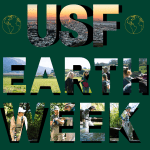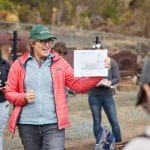Dear USF MSEM Community,
Welcome to the 2022–23 new year!
A warm welcome to all our returning students, faculty, and staff; we hope you’ve had a refreshing summer. We are delighted to welcome a diverse new cohort, with students coming from 6 states and 4 countries, with backgrounds in environmental science, civil engineering & business administration. You are making a wise investment in graduate education, which will serve you well as job markets strengthen, and will serve our communities well as environmental challenges intensify.
Our interdisciplinary and applied work in Environmental Management—rooted in the natural sciences and centered in social justice—is so important at this transformative time. For example, the very timely Fall 2022 course in Wildland Fire Ecology and Management develops understanding of the co-evolution of California wildlands and indigenous peoples with fire, highlighting appropriate management strategies. USF MSEM courses in LiDAR Technology and Google Earth Engine give environmental managers access to richer data sets and enable visualization of the connections between ecological and social well-being. In Environmental Policy, students develop specific and nuanced understanding of environmental justice, and they actively engage in the policy process by making recommendations in Public Comments or a Policy Brief.
Beyond USF, we saw members of the Supreme Court disregard legal precedent and scientific understanding in June 2022, with a ruling that undermines the ability of the U.S. EPA to regulate greenhouse gasses and fossil fuels. Even though Congress specifically includes provisions (such as Section 111 of the Clean Air Act) that empower expert government agencies to act on emerging and timely issues, the 6-to-3 vote by the Court argued that the EPA shouldn’t systemically regulate emissions from power plants.
Meanwhile, through daily hard work in the legislative process, the Senate passed the Inflation Reduction Act on 7 August 2022. This legislation includes investments of nearly $370 billion for climate change and energy security, with tax credits for wind, solar and other renewable power sources, as well as incentives for electric vehicles and energy-efficient heating and cooling systems in buildings. Because individual interests of two Senators created tax loopholes and additional investment in fossil fuels, and gutted other beneficial provisions, more work is urgently needed. Yet the current compromises helped us gain forward momentum in climate policy.
From a systems perspective, we see similar patterns playing out over and over: The ecological and ethical aspects of our global environmental crises demand transformative change, shifting from a mind-set of exploitation to practices of regeneration. But our economic and political systems resist this change, clinging to imbalanced power structures and limiting actions to incremental adjustments. In MSEM, our curriculum builds skills in making transformative change, from ecosystem and watershed management, to environmental law and policy. We are so interested to hear what you do with these skills!
Best wishes for the new year,
Stephanie, Sindy, and Maggie






Jose Luis Castillo
29 Dec 2022 — 9:34 am
What a beautiful. Excellent way of by a sustainable way help our precious planet: Earth–the jewel of the Universe. With the same color of the Almighty God’s eyes. Incredibly beautiful and a living planet. Full of the most generous species.